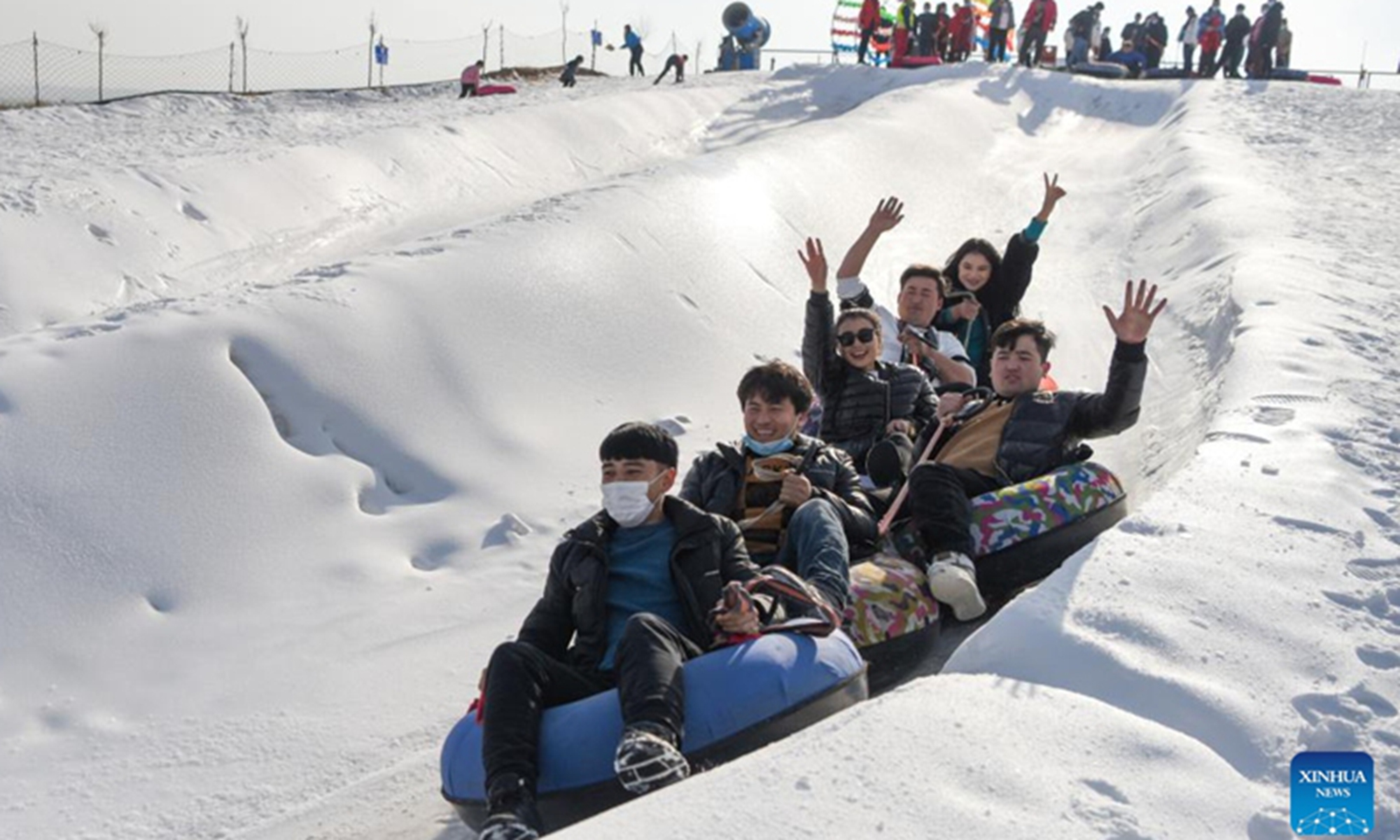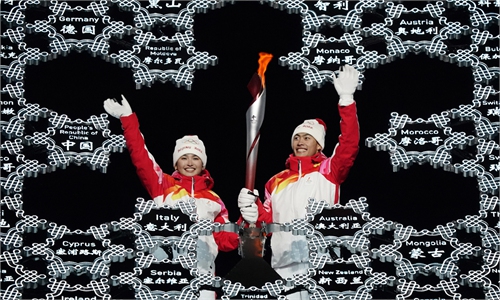Western media don’t want Xinjiang to ride Olympic wave and become a Disney-like resort

Tourists play on snow tubes at Oynak ski resort in Moyu County, northwest China's Xinjiang Uygur Autonomous Region, January 9, 2022. Located on the southern brim of the Taklimakan Desert, Moyu County barely snows in winter. In order to boost its winter tourism and extend the tourism season, the county built Oynak ski resort by making artificial snow, fueling people's passion for winter sports here. Photo: Xinhua
For a long time, the coverage of Northwest China's Xinjiang Uygur Autonomous Region by Western media outlets, such as Agence France-Presse (AFP), is a Don Quixote-style farce.
Xinjiang has time-honored ice and snow culture. Its Altay prefecture is the internationally recognized origin of human skiing activities, which can be traced back 12,000 years. Xinjiang is taking the Beijing 2022 Winter Olympics as an opportunity to vigorously develop its ice and snow economy, such as promoting tourism, sports and culture.
But AFP pointed an accusing finger at it. On Wednesday, AFP posted an article entitled, "Beijing sells troubled Xinjiang as a winter sports paradise." It wrote, "Rights advocates worry China is spotlighting minority athletes to whitewash abuses in the region, adding to propaganda efforts to portray Xinjiang as an attractive tourism destination." The article cited Maya Wang of Human Rights Watch as saying, "The Chinese government has promoted tourism to Xinjiang, turning the region into a sort of Disneyland where inhabitants are stripped of their identity and opinion."
The comments that AFP made are very absurd. In terms of economic development, Xinjiang's boost of its ice and snow economy is a standard green economic development pattern to preserve local inherent ethnic cultural characteristics, and to promote green tourism without environmental pollution. By doing so, Xinjiang can improve the well-being of local people, achieve environmental protection and economic prosperity. What's wrong with that?
Such remarks raise questions: What kind of life do these Western journalists and the so-called rights advocates want people in Xinjiang to live? Do they hope the local residents stay in a broken economy and an impoverished condition? Or do they simply want Xinjiang to become "independent" and cede from China?
AFP's rhetoric only demonstrates that some Western media outlets do not hope to see any good and positive change in Xinjiang. What they really care is not Xinjiang nor people of various ethnic backgrounds who live in Xinjiang. Instead, what they actually focus on is how to stir up troubles in China in general and Xinjiang in particular. And now they regard hyping Xinjiang's so-called human rights issues as a "card" to impair China.
"China should not expect any praise from Western media such as AFP. These media are on the opposite side of China when they report China and the whole world. Take the Soviet Union. After the Soviet Union fell apart, has Russia ever received any goodwill from the West?" asked Shen Yi, a professor at the School of International Relations and Public Affairs of Fudan University. "If China wants to debunk their [Western media's] lies, it needs to continue exploiting various occasions to show the real situation of Xinjiang to the people across the world," Shen noted.
The West has repeatedly and groundlessly accused China of disrespecting human rights in Xinjiang. The truth is, the Chinese government is constantly seeking opportunities, such as the Beijing Olympic Winter Games, to promote the economic development of Xinjiang and to make great efforts to lead the local people to a happier life. Aren't such moves respecting local people in Xinjiang? Is it rational for AFP to criticize these attempts? Or is the West trying to make Xinjiang fit their Western-centrist stereotype, hoping the region remains impoverished and the ordinary people shiver in the freezing cold, to satisfy the West's condescending sense of superiority?
Shen asked, "Why on earth are Western media outlets so angry toward China on the Xinjiang-related affairs? The reason is simple: The rapid and enviable development of Xinjiang has made them feel deeply ashamed of their biased judgment and evil motivation."

